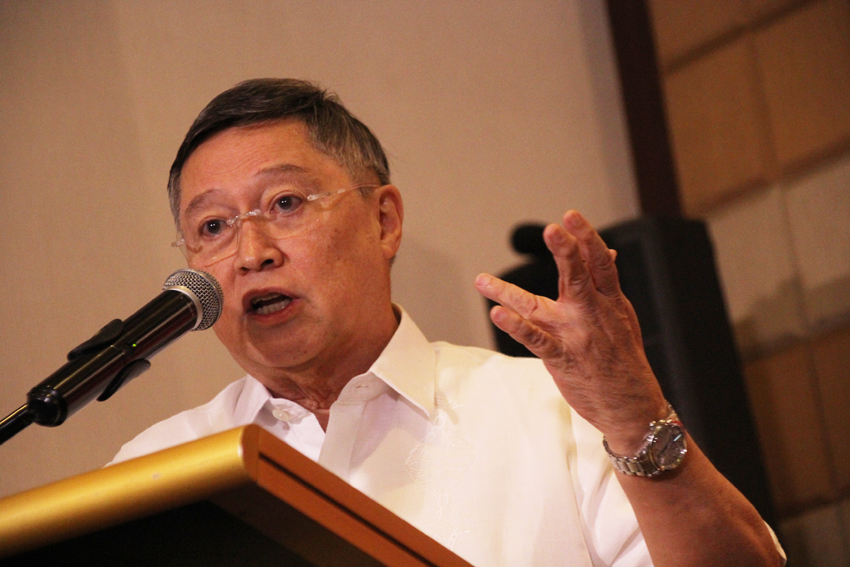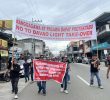
Businessman Carlos “Sonny” Dominguez III, who is a member of the transition team of President-elect Rodrigo Duterte, discusses the eight-point economic agenda of the new administration at the Marco Polo Hotel on Thursday, May 12. (Ace R. Morandante/davaotoday.com)
DAVAO CITY – The camp of presumptive President Rodrigo Duterte presented its eight-point economic agenda on Thursday, May 12.
Carlos Dominguez III, a member of the transition committee of the incoming administration, presented the outline of the economic agenda before the members of the press at the Marco Polo Hotel here.
The agenda were: to continue and maintain the current macroeconomic policies; acceleration of infrastructure spending by addressing, among others, major bottlenecks in the Private Public Partnership program; ensuring attractiveness of the Philippines to foreign direct investments (FDI) by addressing restrictive economic provisions in the Constitution and by-laws, and enhancing competitiveness of the economy; pursuing a genuine agricultural development strategy by providing support services to the small farmers to increase their productivity; addressing the bottlenecks in the land administration and management system; strengthening the basic education system; improving the income tax system; and expanding and improving the implementation of the Conditional Cash Transfer (CCT) program.
Dominguez, a former agriculture secretary, said they plan to complement the macroeconomic policies with reforms in tax revenue collection of the Bureau of Internal Revenues and the Bureau of Customs.
“This will fulfill the President-elect’s promise that there will be less corruption in the government,” said Domiguez.
Dominguez added that they target to set aside five percent of the gross domestic product (GDP) to infrastructure spending.
“Our infrastructure is quite inadequate,” Dominguez said, adding that infrastructure building will help create jobs.
Removing ‘restrictive’ Constitutional economic provisions
Meanwhile, Dominguez said to attract FDIs, the new administration will address “restrictive economic provisions in the Constitution and our laws and enhancing competitiveness of doing business in our economy.”
Dominguez said they plan to follow the Davao City model of doing business, “where licenses are given in the shortest possible time, and where the government is actually helping business to establish in Davao.”
He added that Duterte’s consistent campaign against crime is also part of the plan to attract businesses in the country.
A day after the elections, Duterte’s camp has already announced about passing a law to convene a Constitutional Convention once he is proclaimed as president.
Duterte’s spokesperson, Peter Laviña said:“We need a wide national consensus and agreement so we can proceed to these fundamental changes in our government system.”
He added that the call for a constitutional convention will be in relation to national consensus, which Duterte will require in establishing his three major platforms, which include the fight against drugs and criminality, the shift to a parliamentary federal form of government, and forging peace agreements and political settlements with rebel groups.
Support to farmers
Dominguez said their plan to support to farmers will be a rural-development strategy, involving the increase of the farmer’s productivity by improving their market access and developing the agricultural value chain “by forging partnership with agribusiness firms.”
He said they will provide better irrigation, support services and extension services of the Department of Agriculture.
“It also means that we are going to encourage more agriculture processing in the agricultural areas,” he said.
Strengthening education system
Dominguez said the next administration will strengthen the communication, math and logical thinking of the students in basic education.
“We want to make sure that our people are competitive,” he said.
“We will also provide an expanded scholarship program and we will try to match what is taught with what is demanded in the field,” he said.
He said they will also provide scholarships for tertiary education which are “relevant to the needs of the private sector employees.”
Progressive tax system
Dominguez said they will improve the tax system “to make it progressive to enable those who earn little to have more money in their pockets.
Dominguez said they will also index the CCT program to the inflation rate so that the beneficiaries will get the real value of the cash assistance.
However, Dominguez said they have not yet discussed the issue on contractualization which was among the government policies that Duterte spoke against during the campaign.
Meanwhile, Dominguez said they are planning to expand the coverage of Philhealth for the two thirds of the people who live below the poverty line.
‘Aquino-like’ economy
But, a non-stock and non-profit research group observed a similarity of the path to be treaded by Duterte with that of the outgoing Aquino administration.
Ibon Foundation said on Thursday, that the initial choices for Duterte’s economic team “shows him treading the same Aquino administration path of elitist economics.”
“Duterte’s early pronouncement on Charter change also strongly indicates continuity with the neoliberal economic policies that have kept Filipinos poor and the economy underdeveloped,” the research group said.
Ibon said easing foreign ownership restrictions is a long-standing demand of foreign investors and domestic big businesses “to expand their opportunities for profit-making in the country.”
“This surrenders sovereignty and compromises long-term national development,” Ibon said.
“Declaring a policy that directly and immediately benefits millions of poor Filipinos rather than a handful of wealthy elites would have been more welcome in signalling real change,” it said.
“Farmers, workers and poor Filipinos for instance have long demanded free land distribution, meaningful wage hikes, and fulfilment of their right to education, health and housing,” Ibon added.
Ibon also observed that none among those identified members of the economic team of the incoming administration “represent any kind of break from past failed neoliberal economic policies”.
“These include former Pres. Arroyo’s economic adviser Gov. Joey Salceda and former agriculture secretary, and businessman, Carlos Dominguez III. University of the Philippines School of Economics (UPSE) and Asian Development Bank (ADB) economist Prof. Ernesto Pernia has also been reported as advising Duterte,” said Ibon.
These, said Ibon, are signs that Duterte’s economic policy is “taking shape as a conventional elitist economic agenda.” (davaotoday.com)








